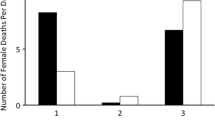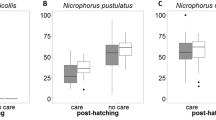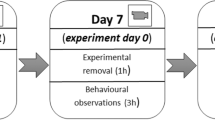Abstract
Selection should favor greater parental effort when the caring individual is more likely to be related to the offspring in its care. If certainty of paternity varies across broods, plasticity in the extent of paternal care may be advantageous, provided that cues of a male’s paternity are available. Consequently, to understand relationships between parentage and parental care, it is necessary to identify the proximate factors governing the decision of males to provide care. Here, we examined parental decision rules in burying beetles, Nicrophorus vespilloides, carrion breeders exhibiting elaborate biparental care. In this species, aggressive interactions that ensue upon the discovery of a carcass by more than one male usually result in a single dominant male that monopolizes access to the carcass and the resident female, relegating subordinates to sneak matings. In the current study, we removed the dominant male after the larvae had hatched and found that about half of the subordinates opted to care for the brood. The decision to provide care was affected by carcass size and the presence of the resident female during the post-hatching period. In a second experiment, we manipulated a subordinate’s access to the resident female and/or the carcass during the pre-hatching period. Surprisingly, we found that mating opportunities had no effect on the subordinate’s decision to provide care. Instead, it was the opportunity to access the carcass that triggered male parental behavior. Our results highlight the need for careful experimental manipulations to identify the cue(s) used by males to assess their certainty of paternity.
Significance statement
Theory predicts that low confidence of paternity should favor a reduction in male parental care. However, empirical studies provide only mixed support for this tenet. A deeper understanding of the relationship between paternity assurance and parental care requires an understanding of the proximate mechanisms governing a male’s decision to care. Burying beetles reproduce on dead vertebrates and are known for their elaborate biparental care. We discovered, unexpectedly, that a male’s decision to care did not depend on his opportunities to mate with the resident female, but rather, on his opportunities to access the carcass. Males given access to the breeding resource cared for young even though they had been denied access to the resident female. Thus, deciphering the cues triggering parental behavior may reveal a “rule of thumb” that explains why paternal care can become unlinked from a male’s paternity.



Similar content being viewed by others
References
Alonzo SH, Heckman KL (2010) The unexpected but understandable dynamics of mating, paternity and paternal care in the ocellated wrasse. Proc R Soc B 277:115–122
Alonzo SH, Klug H, (2012) Paternity, maternity, and parental care. In: Royle NJ, Smiseth PT, Kölliker M (eds) The evolution of parental care. Oxford University Press, Oxford, pp 189–205
Bartlett J (1988) Male mating success and paternal care in Nicrophorus vespilloides (Coleoptera: Silphidae). Behav Ecol Sociobiol 23:297–304
Beecher M (1988) Kin recognition in birds. Behav Genet 18:465–482
Benowitz KM, Moore AJ, (2016) Biparental care is predominant and beneficial to parents in the burying beetle Nicrophorus orbicollis (Coleoptera: Silphidae). Biol J Linn Soc 119:1082–1088
Davies NB (1986) Reproductive success of dunnocks, Prunella modularis, in a variable mating system. I. Factors influencing provisioning rate, nestling weight and fledging success. J Anim Ecol 55:123–138
Davies NB, Hatchwell BJ, Robson T, Burke T (1992) Paternity and parental effort in dunnocks Prunella modularis: how good are male chick-feeding rules? Anim Behav 43:729–745
Dixon A, Ross D, O'Malley SLC, Burke T (1994) Paternal investment inversely related to degree of extra-pair paternity in the reed bunting. Nature 371:698–700
Eggert A-K (1992) Alternative male mate-finding tactics in burying beetles. Behav Ecol 3:243–254
Eggert A-K, Müller JK (1992) Joint breeding in female burying beetles. Behav Ecol Sociobiol 31:237–242
Eggert A-K, Müller JK (1997) Biparental care and social evolution in burying beetles: lessons from the larder. In: Choe JC, Crespi BJ (eds) The evolution of social behavior in insects and arachnids. Cambridge University Press, Cambridge, New York, pp. 216–236
Eggert A-K, Müller JK (2011) Timing of oviposition enables dominant female burying beetles to destroy brood-parasitic young. Anim Behav 82:1227–1233
Engel KC, Stökl J, Schweizer R, Vogel H, Ayasse M, Ruther J, Steiger S (2016) A hormone-related female anti-aphrodisiac signals temporary infertility and causes sexual abstinence to synchronize parental care. Nat Com 7:11035
Engel KC, von Hoermann C, Eggert A-K, Müller JK, Steiger S (2014) When males stop having sex: adaptive insect mating tactics during parental care. Anim Behav 90:245–253
Gray SM, Dill LM, McKinnon JS (2007) Cuckoldry incites cannibalism: male fish turn to cannibalism when perceived certainty of paternity decreases. Am Nat 169:258–263
Head ML, Hinde CA, Moore AJ, Royle NJ (2014) Correlated evolution in parental care in females but not males in response to selection on paternity assurance behaviour. Ecol Lett 17:803–810
House CM, Evans GMV, Smiseth PT, Stamper CE, Walling CA, Moore AJ (2008) The evolution of repeated mating in the burying beetle, Nicrophorus vespilloides. Evolution 62:2004–2014
House CM, Hunt J, Moore AJ (2007) Sperm competition, alternative mating tactics and context-dependent fertilization success in the burying beetle, Nicrophorus vespilloides. Proc R Soc B 274:1309–1315
House CM, Walling CA, Stamper CE, Moore AJ (2009) Females benefit from multiple mating but not multiple mates in the burying beetle Nicrophorus vespilloides. J Evol Biol 22:1961–1966
Houston AI, McNamara JM (2002) A self–consistent approach to paternity and parental effort. Phil Trans R Soc London 357:351–362
Hunt J, Simmons LW (2002) Confidence of paternity and paternal care: covariation revealed through the experimental manipulation of the mating system in the beetle Onthophagus taurus. J Evol Biol 15:784–795
Hunter FM, Petrie M, Otronen M, Birkhead T, Moller AP (1993) Why do females copulate repeatedly with one male? Trends Ecol Evol 8:21–26
Jennions MD, Petrie M (2000) Why do females mate multiply? A review of the genetic benefits. Biol Rev 75:21–64
Kempenaers B, Sheldon BC (1996) Why do male birds not discriminate between their own and extra-pair offspring? Anim Behav 51:1165–1173
Kempenaers B, Sheldon BC (1997) Studying paternity and paternal care: pitfalls and problems. Anim Behav 53:423–427
Kokko H, Jennions MD (2012) Sex differences in parental care. In: Royle NJ, Smiseth PT, Kölliker M (eds) The evolution of parental care. Oxford University Press, Oxford, pp. 101–118
Liedtke J, Fromhage L (2012) When should cuckolded males care for extra-pair offspring? Proc R Soc B 279:2877–2882
Mehlis M, Bakker TCM, Engqvist L, Frommen JG (2010) To eat or not to eat: egg-based assessment of paternity triggers fine-tuned decisions about filial cannibalism. Proc R Soc B 277:2627–2635
Møller AP (1988) Paternity and paternal care in the swallow, Hirundo rustica. Anim Behav 36:996–1005
Møller AP, Birkhead TR (1993) Certainty of paternity covaries with paternal care in birds. Behav Ecol Sociobiol 33:261–268
Müller JK, Eggert A-K (1990) Time-dependent shifts between infanticidal and parental behavior in female burying beetles a mechanism of indirect mother-offspring recognition. Behav Ecol Sociobiol 27:11–16
Neff BD (2003) Decisions about parental care in response to perceived paternity. Nature 422:716–719
Neff BD, Sherman PW (2003) Nestling recognition via direct cues by parental male bluegill sunfish (Lepomis macrochirus). Anim Cogn 6:87–92
Neff BD, Sherman PW (2005) In vitro fertilization reveals offspring recognition via self-referencing in a fish with paternal care and cuckoldry. Ethology 111:425–438
Oldekop JA, Smiseth PT, Piggins HD, Moore AJ (2007) Adaptive switch from infanticide to parental care: how do beetles time their behaviour? J Evol Biol 20:1998–2004
Otronen M (1988) The effect of body size on the outcome of fights in burying beetles Nicrophorus. Ann Zool Fennici 25:191–201
Parker DJ, Cunningham CB, Walling CA, Stamper CE, Head ML, Roy-Zokan EM, McKinney EC, Ritchie MG, Moore AJ (2015) Transcriptomes of parents identify parenting strategies and sexual conflict in a subsocial beetle. Nat Commun 6:8449
Pettinger AM, Steiger S, Müller JK, Sakaluk SK, Eggert A-K (2011) Dominance status and carcass availability affect the outcome of sperm competition in burying beetles. Behav Ecol 22:1079–1087
Pukowski E (1933) Ökologische untersuchungen an Necrophorus F. Z Morphol Ökol Tiere 27:518–586
Robertson IC (1993) Nest intrusions, infanticide, and parental care in the burying beetle, Nicrophorus orbicollis (Coleoptera: Silphidae). J Zool 231:583–593
Scott MP (1998) The ecology and behavior of burying beetles. Annu Rev Entomol 43:595–618
Sheldon BC (2002) Relating paternity to paternal care. Phil Trans R Soc London 357:341–350
Sheldon BC, Ellegren H (1998) Paternal effort related to experimentally manipulated paternity of male collared flycatchers. Proc R Soc B 265:1737–1742
Smiseth PT, Dawson C, Varley E, Moore AJ (2005) How do caring parents respond to mate loss? Differential response by males and females. Anim Behav 69:551–559
Smiseth PT, Ward RJS, Moore AJ (2006) Asynchronous hatching in Nicrophorus vespilloides, an insect in which parents provide food for their offspring. Funct Ecol 20:151–156
Steiger S (2015) Recognition and family life: recognition mechanisms in the biparental burying beetle. In: Aquiloni L, Tricarico E (eds) Social recognition in invertebrates. Springer International Publishing, pp 249–266
Steiger S, Franz R, Eggert A-K, Müller JK (2008) The Coolidge effect, individual recognition and selection for distinctive cuticular signatures in a burying beetle. Proc R Soc B 275:1831–1838
Steiger S, Gershman SN, Pettinger AM, Eggert A-K, Sakaluk SK (2012) Dominance status and sex influence nutritional state and immunity in burying beetles Nicrophorus orbicollis. Behav Ecol 23:1126–1132
Trivers R (1972) Parental investment and sexual selection. In: Campbell B (ed) Sexual selection and the descent of man. Aldine Press, Chicago, pp. 139–179
Trumbo ST (1990a) Interference competition among burying beetles (Silphidae, Nicrophorus). Ecol Entomol 15:347–355
Trumbo ST (1990b) Reproductive benefits of infanticide in a biparental burying beetle Nicrophorus orbicollis. Behav Ecol Sociobiol 27:269–274
Westneat DF, Sherman PW (1993) Parentage and the evolution of parental behavior. Behav Ecol 4:66–77
Wolff JO, Macdonald DW (2004) Promiscuous females protect their offspring. Trends Ecol Evol 19:127–134
Acknowledgments
We thank Eva Keppner and Petra Jentschke for helping to rear and maintain the beetles, and we are grateful to Manfred Ayasse for providing lab space. This work was supported by a grant from the German Research Foundation (DFG) to SS (STE 1874/3-1) and a grant from the National Science Foundation (NSF) to SKS (IOS-1118160).
Author contributions
SS conceived and designed the study, ABL and RS performed the experiments, ABL and SS analyzed the data, and SS and SKS cowrote the manuscript.
Author information
Authors and Affiliations
Corresponding author
Additional information
Responsible editor: J. C. Choe
Electronic supplementary material
Supplementary Table 1
(DOCX 18 kb)
Rights and permissions
About this article
Cite this article
Luzar, A.B., Schweizer, R., Sakaluk, S.K. et al. Access to a carcass, but not mating opportunities, influences paternal care in burying beetles. Behav Ecol Sociobiol 71, 7 (2017). https://doi.org/10.1007/s00265-016-2232-x
Received:
Revised:
Accepted:
Published:
DOI: https://doi.org/10.1007/s00265-016-2232-x




